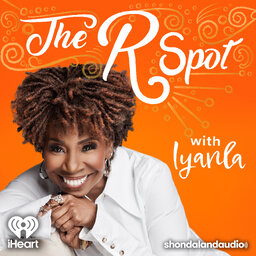The Love Jones Cohort with Dr. Kris Marsh: Part 2
Welcome back to part two of Iyanla's conversation with Dr. Kris Marsh! This week, they're opening up the conversation and taking questions from the IG live audience. They get into everything from how to redefine family to the financial penalty of being single. Plus, we hear why living trusts and wills are a must-have.
Do you want to be on the podcast? Follow Iyanla on social media for the latest call-in information!
Instagram & X: @IyanlaVanzant
Facebook: @DrIyanlaVanzant
In 1 playlist(s)
The R Spot with Iyanla
Each week, New York Times best-selling author and famed spiritual life coach, Iyanla Vanzant, invite…Social links
Follow podcast
Recent clips

Permission to be Vulnerable with Kier Gaines
56:41

The Love Jones Cohort with Dr. Kris Marsh: Part 1
35:38

Challenging Lessons In Love
54:10
 The R Spot with Iyanla
The R Spot with Iyanla